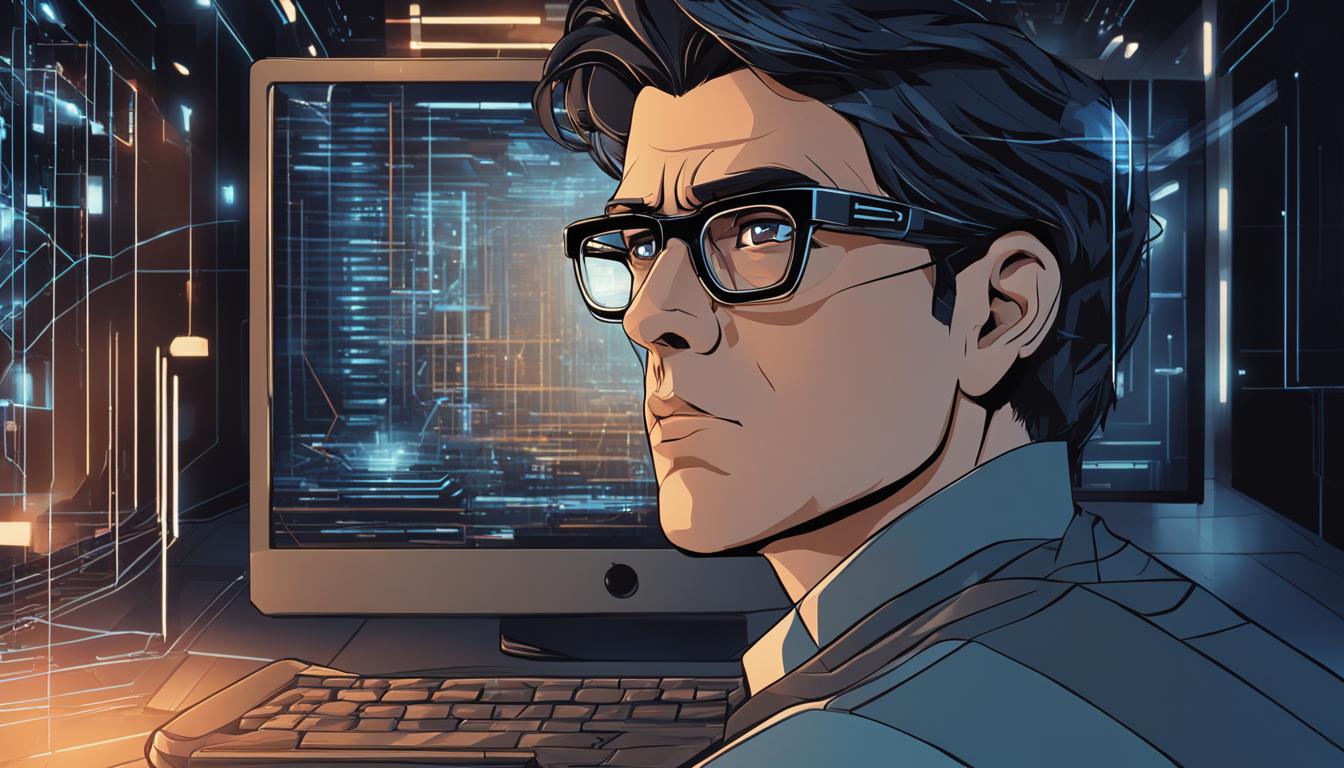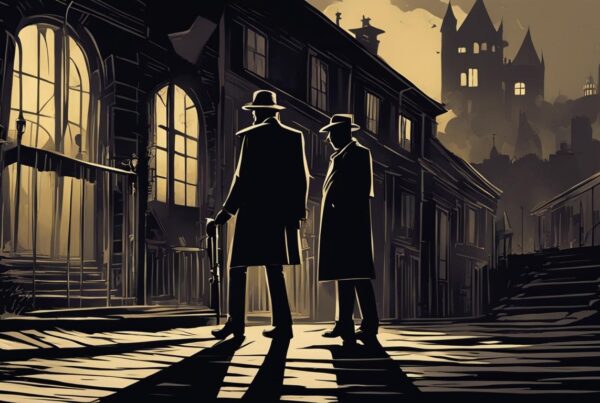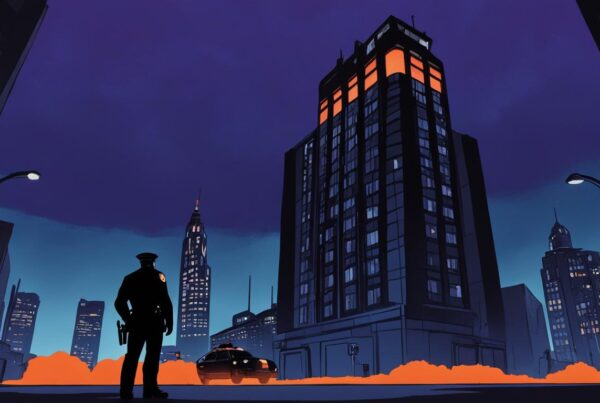Looking for a mesmerizing book that will make you contemplate the power of imagination? You should definitely give Richard Powers’ “Plowing the Dark” a go. This groundbreaking novel is a must-read for anyone interested in exploring the intersection between technology and human experience.
In this section, we provide a comprehensive book summary of “Plowing the Dark.” If you’re looking for a quick overview of the book or just want to refresh your memory before diving deeper into the themes explored within the narrative, you’ve come to the right place.
Richard Powers is an award-winning author who has published numerous critically acclaimed works of fiction. He is known for his masterful storytelling and his ability to tackle complex philosophical and scientific themes with ease. His writing style is engaging, descriptive, and thought-provoking – making his books a joy to read for any literary enthusiast.
So, let’s begin with a summary of “Plowing the Dark” by Richard Powers, and discover the key themes and impact of this thought-provoking novel.
Overview of “Plowing the Dark”
“Plowing the Dark” is a novel by Richard Powers, published in 2000. The story takes place in two distinct settings – a virtual reality lab in Seattle during the late 1980s and a hostage room in an unnamed country. The novel revolves around two main characters – Adie Klarpol, a virtual reality expert, and Taimur Martin, a prisoner held captive in a dark room.
The narrative switches back and forth between these two settings, exploring the themes of imagination, perception, reality, and technology. The characters’ experiences in both settings are intertwined, as they struggle to come to terms with their respective situations and find meaning in their lives.
Overall, “Plowing the Dark” is a complex and thought-provoking novel that challenges readers to reconsider their understanding of the world around them. It is a must-read for those interested in exploring the intersection of technology and human experience.
Themes Explored in “Plowing the Dark”
In “Plowing the Dark” by Richard Powers, several themes are explored that evoke thought and challenge the readers’ understanding. The prominent themes that shape the narrative are the impact of technology, the nature of reality, and the power of imagination.
The Impact of Technology
The influence of technology on human lives is central to the novel. The narrative depicts how technology shapes the characters’ perception of the world and impacts their interpersonal relationships. The author highlights how technology can lead to both positive and negative consequences.
“The ecology of static filled space was already spreading. Dwindling bandwidth was choking bandwidth, the data stream subdividing into smaller and lonelier tributaries, government and corporations staking out territory in a data-free cobweb of trademark and exclusion zone.”>
The character, Taimur Martin, the founder of a virtual reality start-up, represents the positive role of technology. For Taimur, technology is the ultimate tool to unlock human imagination that will lead to a creative and intellectual revolution. At the same time, the character of Emma, a captive in Lebanon, embodies the negative effects of technology. Emma uses a crude virtual reality to escape daily life, but her dependence on it makes her lose touch with reality.
The Nature of Reality
Another significant theme explored in the novel is the nature of reality. The narrative challenges the readers’ perception of what is real and what is not. The virtual world created by Taimur blurs the line between reality and illusion, while Emma’s isolation makes her question the veracity of her daily existence.
The following quote embodies the questioning of what reality is:
“Reality never lived up to the promise of its signs, never caught up with its framing devices. People kept waiting for the moment when real time would start, would finally trump its virtual pretenders. But the moment never came.”
The novel suggests that our reality is a subjective interpretation of the world and highlights how technology can shape and influence our sense of what is real and what is not.
The Power of Imagination
Finally, the power of imagination is another compelling theme in “Plowing the Dark”. The narrative emphasizes the abilities of the human imagination to solve problems, overcome barriers, and cope with difficult situations.
The quote below depicts the significance of human imagination in the novel:
“Everything he sees or hears has to be translated and transcribed before his brain can experience it. Except for the darkness of his own head, which is illuminated by ideas that lightweight Amelia cannot imagine or deflect.”
Through various characters in the novel who use their imagination to cope with their difficult situations, the author highlights the strength of the human mind to think beyond what is given and find solutions that are not immediately visible.
The Role of Technology in “Plowing the Dark”
Technology plays a significant role in the development of the narrative in “Plowing the Dark” by Richard Powers. From the outset, we see how technology influences the lives of the characters and shapes their interactions with the world around them. The use of virtual reality technology, for instance, enables the characters to enter a different realm and explore new possibilities.
Throughout the novel, we see how technology impacts the characters’ perception of reality and influences their decision making. The central characters, for example, turn to technology to escape their mundane lives and find meaning in a world that seems devoid of it. This reliance on technology highlights the potential risk to human autonomy and raises questions about the impact of technology on our lives.
In addition to highlighting the impact of technology, the novel also comments on the role of technology in society. Through the lens of the characters, we see how technology can both facilitate and hinder communication, making it easier to connect with others while simultaneously making it more difficult to form meaningful connections. This commentary provokes thought about the benefits and drawbacks of technology and its impact on our social lives.
The Exploration of Virtual Worlds in “Plowing the Dark”
“Plowing the Dark” by Richard Powers explores the immersive experience of virtual worlds and its impact on the characters’ lives. The novel takes place across two different timelines: one in the physical world, and one in a prison-like VR simulation. Through this unique structure, Powers highlights the all-consuming nature of virtual reality and the dangers of losing oneself within it.
The virtual reality worlds in “Plowing the Dark” are vividly described and evoke a sensory experience for the reader. Powers creates a believable and complex virtual environment, which is a testament to his ability to paint a detailed picture with words. As readers immerse themselves in the virtual worlds, they are confronted with the same existential questions that the characters face. What is real? What makes us human? How much of ourselves are we willing to sacrifice for the sake of technology?
The virtual worlds in “Plowing the Dark” also provide a platform for exploring ideas and themes that are difficult to bring to life in the physical world. In the virtual world of the narrative, time and space are malleable, allowing characters to transcend boundaries and have experiences far beyond what is possible in their physical lives. Powers uses this to explore the limits of human consciousness and to ask questions about the nature of existence.
By immersing readers in different virtual worlds, Powers shows how technology can change the way we perceive reality. The novel challenges readers to consider the implications of this technology and to evaluate the role that it plays in our lives.
The Nature of Reality in “Plowing the Dark”
Reality is a central theme in “Plowing the Dark.” Richard Powers challenges readers’ perception of what is real by blurring the lines between the physical and virtual worlds. The novel explores the idea that reality is subjective and can be shaped by technology and human imagination.
The impact of technology on our understanding of reality is a key theme in the novel. The virtual world created by the characters in “Plowing the Dark” is just as vivid and alive as the physical world, prompting readers to question the nature of reality and the role of technology in shaping it.
“The virtual and the real tended to blur. The physical laws that governed the universe became more like smart suggestions; the spaces between solid objects became opportunities for something new.”
The above quote exemplifies the novel’s exploration of the nature of reality and the power of technology to alter it. Powers uses vivid metaphors and descriptive language to paint a picture of a world where the line between the physical and virtual is blurred.
The influence of technology on the human perception of reality is a recurring theme in science fiction literature, but “Plowing the Dark” takes it to a new level by creating a compelling narrative around the topic. The novel is a must-read for anyone interested in the intersection of technology and humanity, and its impact on our understanding of the world around us.

The Power of Imagination in “Plowing the Dark”
Richard Powers’ “Plowing the Dark” explores the incredible power of imagination in its characters. Each of them faces unique challenges throughout the novel, ranging from being trapped in a dark cell to struggling with mental illness, and must turn to their imaginations to cope with their circumstances.
The author shows us that imagination is not just a means of escape, but a vital tool for survival in difficult times. As the character Raymond reflects, “The present is terrible. The future is terrifying. The only place to rest is in the past, in what never was, in what was glimpsed carelessly and left behind, the way we lost infinity in a headcount.” By using their imaginations to envision a better future or relive happier times, the characters find solace and strength to persevere.
“The present is terrible. The future is terrifying. The only place to rest is in the past, in what never was, in what was glimpsed carelessly and left behind, the way we lost infinity in a headcount.” – Raymond
Furthermore, the power of imagination is not limited to personal use, but also has the potential to shape reality itself. This is demonstrated through the use of virtual reality in the novel, which blurs the lines between what is real and what is imagined. The imagination of the characters is so strong that they are able to create entire worlds within the virtual realm, influencing their actions and relationships in the real world.
Overall, “Plowing the Dark” celebrates the incredible power of imagination and its ability to help us cope with adversity and shape our perception of reality. It reminds us of the importance of harnessing our imaginations in our daily lives and utilizing its potential to create positive change.
Analysis of the Characters in “Plowing the Dark”
The characters in “Plowing the Dark” are complex and well-developed, each with their own unique motivations and challenges. While the novel presents two distinct storylines, the primary focus is on the character development and growth throughout.
The two main characters of the first narrative thread are Richard Kraft, an American game designer, and his translator, Jacqueline. Both characters are grappling with the challenges of a foreign language and culture, as well as personal struggles with loss and identity. Throughout the novel, Richard’s passion for technology and innovation drives his actions, while Jacqueline seeks to find her place in the world and hold onto her cultural roots.
The second storyline follows a group of political prisoners held captive in a dark basement. While they are physically confined, their imaginations and memories provide a sense of escape and freedom. The characters in this storyline are each coping with the trauma of their imprisonment in their own way, with some finding solace in the virtual world created by Richard Kraft.
Through the character development in “Plowing the Dark,” Richard Powers explores the complexities of the human experience and the impact of technology on our lives. The characters’ struggles and triumphs are relatable and thought-provoking, leaving readers with a deeper understanding of the novel’s themes and messages.
“We rely on these machines to create alternate worlds we can love and live in. We use them to escape real regimes of time and space, where we are less in control.” – Richard Powers, Plowing the Dark
Narrative Structure in “Plowing the Dark”
The unique narrative structure in “Plowing the Dark” is one of the most impressive aspects of Richard Powers’ novel. The author interweaves different perspectives and timelines to create a captivating story that keeps readers engaged from beginning to end.
The novel follows two parallel narratives: one set in a Virtual Reality laboratory in the early 1990s, and the other in a solitary cell in Lebanon in the late 1980s. The VR part explores the interaction between people and technology, while the prison section deals mainly with the human psyche and coping mechanisms.
The power of the narrative structure lies in the constant flux between these two narratives, which is cleverly executed and keeps the reader’s attention. The transition between the VR and prison sections is always composed carefully to contrast and highlight the differences between them. It sets the tone for an eye-opening experience, leading readers to see how the interaction between technology and humanity shapes our perceptions and influences our lives.
“The power of the narrative structure lies in the constant flux between these two narratives, which is cleverly executed and keeps the reader’s attention.”
Through this narrative structure, Richard Powers creates a vivid picture of the human experience and technological innovation. The different characters and storylines intersect, creating a collage of the experience of different people and their interactions with technology. It makes for a fascinating read that encourages reflection and thoughtful exploration.
Writing Style and Language in “Plowing the Dark”
The writing style and language used by Richard Powers in “Plowing the Dark” is both descriptive and insightful, immersing the reader into the story’s intricate world. Powers’ use of metaphors and similes is particularly noteworthy, lending a poetic quality to the prose that elevates the novel beyond a simple work of fiction. His attention to detail and rich descriptions create a vivid and engaging reading experience, which is enhanced through the seamless integration of technology into the narrative.
The impact of Powers’ writing style on the reader is profound, drawing them into the story and creating an emotional connection with the characters. Through his evocative use of language, Powers is able to capture the complexity of the human experience, making “Plowing the Dark” a powerful exploration of the intersection between technology and humanity.
“Powers’ use of metaphors and similes is particularly noteworthy, lending a poetic quality to the prose that elevates the novel beyond a simple work of fiction.”
The eloquent descriptions and narrative structure used by Powers showcase his skill as a writer, allowing readers to fully engage with and appreciate his work. His use of technology as a central component of the narrative further highlights the power of writing to address the complexities of contemporary society. Overall, Richard Powers’ writing style and language in “Plowing the Dark” contribute significantly to the novel’s success, elevating it to a work of art and literature that continues to captivate audiences today.
Critical Reception of “Plowing the Dark”
“Plowing the Dark” by Richard Powers received widespread critical acclaim upon its release. Critics praised the novel for its unique exploration of technology and imagination, as well as its captivating narrative structure and descriptive writing style.
According to The New York Times Book Review, “Powers has created a new kind of techno-prose poem that is often breathtaking in its beauty.” Similarly, The Washington Post noted that “Plowing the Dark” is an “intelligent and imaginative novel that spans the virtual and real worlds with equal grace.”
Despite its critical success, some reviewers criticized the novel’s intricate plot and the complexity of its themes. A review published in Publishers Weekly noted that “the novel’s convoluted structure may prove too difficult for some readers to follow.”
“‘Plowing the Dark’ is a rich, multi-layered work that rewards readers who are willing to invest their time and attention into its complex narrative. While not without its flaws, the novel is a remarkable achievement that demonstrates Powers’ status as one of the most important contemporary American writers.”

Notable Reviews
| Publication | Reviewer | Quote |
|---|---|---|
| The New York Times Book Review | Michiko Kakutani | “A prodigious feat of storytelling that is both inventive and inspirational.” |
| The Washington Post | Jonathan Yardley | “A thrilling exploration of the intersection between the real and virtual worlds.” |
| The Guardian | James Wood | “A deeply moving and thought-provoking novel that pushes the boundaries of what literature can accomplish.” |
Cultural and Social Impact of “Plowing the Dark”
Richard Powers’ “Plowing the Dark” is a novel that carries a significant cultural and social impact. Through its exploration of technology and imagination, the novel challenges traditional norms and beliefs, forcing readers to question their understanding of the world around them. As technology increasingly permeates every aspect of society, “Plowing the Dark” offers insights into its potential impact on humanity.
One of the key cultural impacts of the novel is its ability to spark conversations about the role of technology in our lives. Through its portrayal of virtual worlds and the use of technology for communication, the novel encourages readers to consider the broader implications of technology on our social interactions and relationships. It highlights the challenges of human connection in the digital age and depicts how technology can both isolate and bring people together.
In terms of social impact, “Plowing the Dark” offers a nuanced depiction of society and the human experience. The novel explores themes of isolation, loss, and the power of imagination, providing readers with a deep understanding of what it means to be human. It encourages readers to question their understanding of reality and to consider the role of imagination in shaping our view of the world.
“The technologies that mold us become us. The stories we tell ourselves define us. Reality reshapes itself around the things we build and the stories we believe. ‘Plowing the Dark’ is a novel that understands the complex dance between technology and humanity, imagination and reality.”
As society continues to grapple with the impact of technology and the evolving nature of human connection, “Plowing the Dark” provides readers with a thoughtful and insightful analysis of these themes. It is a novel that continues to resonate with readers, inspiring conversations and challenging our understanding of the world around us.
Similar Works by Richard Powers
If you’re a fan of “Plowing the Dark” by Richard Powers and want to delve into more of his works, here are some similar books you should add to your reading list:
- The Echo Maker – Winner of the National Book Award, this novel explores the concept of identity and memory through the story of a man who suffers from Capgras Syndrome.
- The Overstory – This Pulitzer Prize-winning novel follows nine characters whose lives intersect due to their shared connection to trees and forests.
- Galatea 2.2 – A thought-provoking exploration of artificial intelligence and consciousness, this novel tells the story of a writer who teams up with an AI to create a new work of literature.
- The Time of Our Singing – Set against the backdrop of the Civil Rights Movement, this novel follows the lives of a mixed-race family of musicians as they navigate issues of race, identity, and belonging.
Influences and Inspirations for “Plowing the Dark”
Richard Powers is known for his eclectic writing style, which draws inspiration from a wide range of sources. “Plowing the Dark,” like many of his works, is influenced by literature, philosophy, and technology.
One of the primary literary influences on “Plowing the Dark” is Jorge Luis Borges, whose works often explore the nature of reality and the power of imagination. The novel also draws inspiration from the works of William Gibson, a pioneer of the cyberpunk genre, which explores the intersection of technology and society.
In addition to literature, “Plowing the Dark” is influenced by philosophy, particularly the works of postmodernist thinkers such as Jacques Derrida and Jean Baudrillard. The novel engages with postmodern themes such as the fragmentation of reality and the role of language in shaping our understanding of the world.
Finally, “Plowing the Dark” is heavily influenced by technology, particularly virtual reality and the internet. Powers was fascinated by the potential of this emerging technology to create immersive experiences and push the boundaries of what we perceive as reality.
“I’m interested in machines and what they can do to human beings. I’m fascinated by the way that technology shapes our lives and our perception of the world. And I’m interested in exploring the limits of the imagination and what we can achieve when we push them to their fullest potential.” – Richard Powers
Discussion and Analysis of the Ending
The ending of “Plowing the Dark” has sparked much debate among readers and critics alike. Some view it as a fitting conclusion to the novel’s exploration of the power of imagination, while others see it as a commentary on the limitations of technology.
One interpretation of the ending is that it suggests the inseparable connection between the virtual world and reality. The main character’s journey throughout the novel leads him to a realization that the virtual world is not just a mirror of reality but an extension of it. This is exemplified in the final scene, where he merges with technology and experiences a sense of liberation.
However, some readers may view this ending as a cautionary tale about the uncontrollable influence of technology. The novel highlights the transformative power of technology, which may ultimately replace human nature. This is reflected in the way the characters navigate their relationships and perceptions in the virtual world, leading to a loss of identity and self.
In conclusion, the ending of “Plowing the Dark” is open to interpretation and analysis, revealing the complexity and depth of Richard Powers’ writing. It leaves readers with a sense of wonder and provokes profound questions about the relationship between humanity and technology in a constantly evolving digital world.
Conclusion
In conclusion, “Plowing the Dark” by Richard Powers is a thought-provoking novel that offers a unique exploration of the impact of technology on our lives. Through its immersive depiction of virtual worlds and its examination of the nature of reality and the power of imagination, the novel challenges readers to reconsider their own perceptions of the world around them.
The novel’s writing style and narrative structure are captivating and contribute to its lasting impact on readers. Richard Powers’ skillful prose and ability to interweave different perspectives and timelines create a compelling story that resonates with readers long after they put the book down.
The critical reception of “Plowing the Dark” is a testament to its significance in contemporary literature. Its cultural and social impact is also noteworthy as it continues to stimulate discussions on the role of technology in our lives.
Overall, “Plowing the Dark” is a must-read for anyone interested in thought-provoking literature that challenges conventional ideas and perception. Its impact on readers and society as a whole speaks to the power of literature to inspire and influence change.



